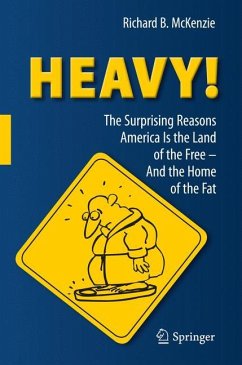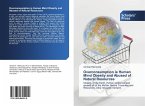America's emerging "fat war" threatens to pit a shrinking population of trim Americans against an expanding population of heavy Americans in raging policy debates over "fat taxes" and "fat bans." These "fat policies" would be designed to constrain what people eat and drink - and theoretically crimp the growth in Americans' waistlines and in the country's healthcare costs.
Richard McKenzie's HEAVY! The Surprising Reasons America Is the Land of the Free-And the Home of the Fat offers new insight into the economic causes and consequences of America's dramatic weight gain over the past half century. It also uncovers the follies of seeking to remedy the country's weight problems with government intrusions into people's excess eating, arguing that controlling people's eating habits is fundamentally different from controlling people's smoking habits.
McKenzie controversially links America's weight gain to a variety of causes:
the growth in world trade freedom, the downfall of communism, the spread of free-market economics, the rise of women's liberation, the long-term fall in real minimum wage,and the rise of competitive markets on a global scale.
In no small way - no, in a very BIG way - America is the "home of the fat" because it has been for so long the "land of the free." Americans' economic, if not political, freedoms, however, will come under siege as well-meaning groups of "anti-fat warriors" seek to impose their dietary, health, and healthcare values on everyone else.
HEAVY! details the unheralded consequences of the country's weight gain, which include greater fuel consumption and emissions of greenhouse gases, reduced fuel efficiency of cars and planes, growth in health insurance costs and fewer insured Americans, reductions in the wages of heavy people, andrequired reinforcement of rescue equipment and hospital operating tables.
McKenzie advocates a strong free-market solution to how America's weight problems should and should not be solved. For Americans to retain their cherished economic freedoms of choice, heavy people must be held fully responsible for their weight-related costs and not be allowed to shift blame for their weight to their genes or environment. Allowing heavy Americans to shift responsibility for their weight gain can only exacerbate the country's weight problems.
Richard McKenzie's HEAVY! The Surprising Reasons America Is the Land of the Free-And the Home of the Fat offers new insight into the economic causes and consequences of America's dramatic weight gain over the past half century. It also uncovers the follies of seeking to remedy the country's weight problems with government intrusions into people's excess eating, arguing that controlling people's eating habits is fundamentally different from controlling people's smoking habits.
McKenzie controversially links America's weight gain to a variety of causes:
the growth in world trade freedom, the downfall of communism, the spread of free-market economics, the rise of women's liberation, the long-term fall in real minimum wage,and the rise of competitive markets on a global scale.
In no small way - no, in a very BIG way - America is the "home of the fat" because it has been for so long the "land of the free." Americans' economic, if not political, freedoms, however, will come under siege as well-meaning groups of "anti-fat warriors" seek to impose their dietary, health, and healthcare values on everyone else.
HEAVY! details the unheralded consequences of the country's weight gain, which include greater fuel consumption and emissions of greenhouse gases, reduced fuel efficiency of cars and planes, growth in health insurance costs and fewer insured Americans, reductions in the wages of heavy people, andrequired reinforcement of rescue equipment and hospital operating tables.
McKenzie advocates a strong free-market solution to how America's weight problems should and should not be solved. For Americans to retain their cherished economic freedoms of choice, heavy people must be held fully responsible for their weight-related costs and not be allowed to shift blame for their weight to their genes or environment. Allowing heavy Americans to shift responsibility for their weight gain can only exacerbate the country's weight problems.
America's emerging "fat war" threatens to pit a shrinking population of trim Americans against an expanding population of heavy Americans in raging policy debates over "fat taxes" and "fat bans." These "fat policies" would be designed to constrain what people eat and drink - and theoretically crimp the growth in Americans' waistlines and in the country's healthcare costs. Richard McKenzie's HEAVY! The Surprising Reasons America Is the Land of the Free - And The Home of the Fat offers new insight into the economic causes and consequences of America's dramatic weight gain over the past half century. It also uncovers the follies of seeking to remedy the country's weight problems with government intrusions into people's excess eating, arguing that controlling people's eating habits is fundamentally different from controlling people's smoking habits. McKenzie controversially links America's weight gain to a variety of causes: · the growth in world trade freedom, · the downfall of communism, · the spread of free-market economics, · the rise of women's liberation, · the long-term fall in real minimum wage, · and the rise of competitive markets on a global scale. In no small way - no, in a very BIG way - America is the "home of the fat" because it has been for so long the "land of the free." Americans' economic, if not political, freedoms, however, will come under siege as well-meaning groups of "anti-fat warriors" seek to impose their dietary, health, and healthcare values on everyone else. HEAVY! details the unheralded consequences of the country's weight gain, which include greater fuel consumption and emissions of greenhouse gases, reduced fuel efficiency of cars and planes, growth in health insurance costs and fewer insured Americans, reductions in the wages of heavy people, and required reinforcement of rescue equipment and hospital operating tables.








